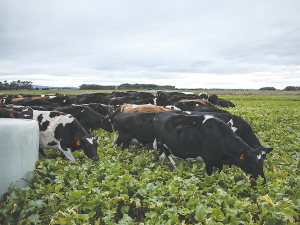DairyNZ Levy Vote Underway as Chair Highlights Seven-Fold Return
Voting has started for the renewal of DairyNZ's milksolids levy.
 DairyNZ says conversations with farmers have identified changes to reduce soil run-off, as well as smart ideas to graze strategically so drier parts of a paddock are available in wet weather.
DairyNZ says conversations with farmers have identified changes to reduce soil run-off, as well as smart ideas to graze strategically so drier parts of a paddock are available in wet weather.
Winter grazing farm plans have proved more popular than ever in 2021.
An estimated 80% of dairy farmers had winter grazing plans as the season got underway in June and over 1200 farmers have completed the Beef + Lamb New Zealand (B+LNZ) Winter Grazing Module.
DairyNZ farm performance general manager Sharon Morrell says DairyNZ’s annual winter grazing consultation with 150 Southland and South Otago farmers highlighted the prep and good management practices in place this past season.
“Around 80% of dairy farmers had a plan last winter,” Morrell says. “But there was also a clear desire of farmers to go the extra mile.
“Plans help farmers think through and implement practices and contingencies that deliver good outcomes through winter,” she told Dairy News.
She says farmers can use an industry plan, through DairyNZ or B+LNZ, or a plan from the Ministry for Primary Industries (MPI).
“Planning for winter and wet weather is important to deliver good outcomes, especially when adverse weather arrives.
“We are all looking to continue lifting winter grazing performance, and using a wintering checklist and practical plan helps farmers, graziers and their teams do that,” Morrell says.
She says the sector is committed to collaboratively delivering winter grazing that protects animals and the environment. “This motivation is really evident this season and farmers are taking action and adopting new practices.
“Farmers are focused on delivering and encouraging others, and we are largely seeing good practices. Farmers are also expecting a team effort and to see assistance delivered for any farmers who need it.”
Conversations with farmers have identified changes to reduce soil run-off, as well as smart ideas to graze strategically so drier parts of a paddock are available in wet weather.
Also identified was a need for farm decision makers to close the loop with the team managing paddocks to help with day to day management.
“The feedback we’re getting from farmers is they appreciate the practical farmer-led approach and we’ll continue to work across the sector, with regional councils and farmers on achieving positive outcomes across animal welfare, the environment and sustainable farming business.”
Morrell says she encourages farmers to review the past winter.
“Now is a good time to reflect on what went well and can be improved for next season. Look back over the last two winters – what were the wins and what needs improvement?”
Plan paddock selection and cultivation with those lessons in mind – think about how the system, including your team, coped this season, she says.
Having a written plan is a good start.
“It takes farmers through the key planning and actions prior to winter,” she says.
“When the plan is in place, the next step is ensuring it’s discussed with the team – farm teams need to know what the plan is and continue reviewing it each and every weather event throughout winter. It’s a live resource to keep working with throughout the winter.”
Pāmu has welcomed ten new apprentices into its 2026 intake, marking the second year of a scheme designed to equip the next generation of farmers with the skills, knowledge, and experience needed for a thriving career in agriculture.
One team with 43 head, including a contingent from Mid Canterbury, are reflecting on a stellar NZ DairyEvent.
Fonterra farmer shareholders have approved the mechanism for a $2/share capital return expected from the sale of its global consumer and associated businesses.
Trainees in the horticulture industry studying towards a certificate or diploma can now apply for Horticulture New Zealand's (HortNZ) 2026 Industry Training Scholarships programme.
OPINION: The first three Global Dairy Trade (GDT) auctions have been a morale booster for farmers.
Former Fonterra executive Alex Turnbull has been appointed CEO to lead all five Yili Oceania Business Division companies in New Zealand.
OPINION: Staying with politics, with less than nine months to go before the general elections, there’s confusion in the Labour…
OPINION: Winston Peters' tirade against the free trade deal stitched with India may not be all political posturing by the…